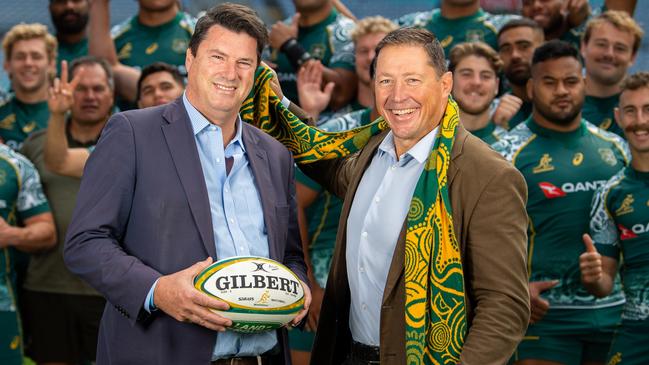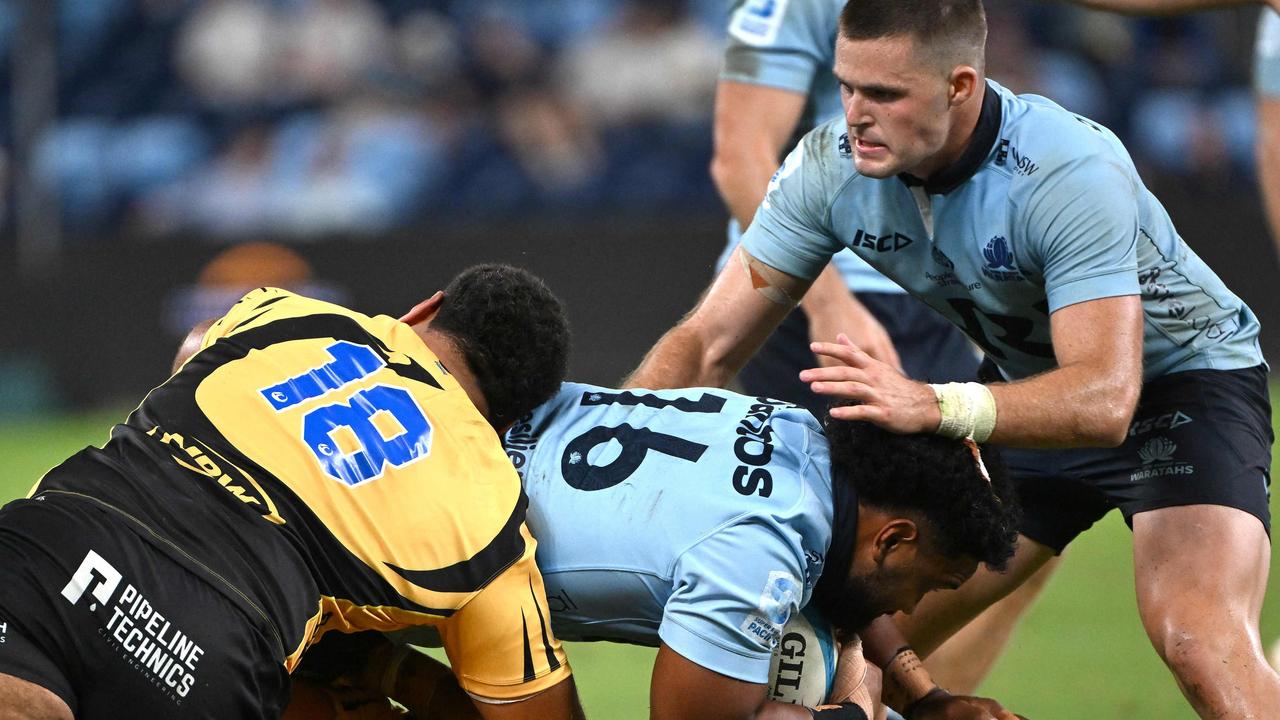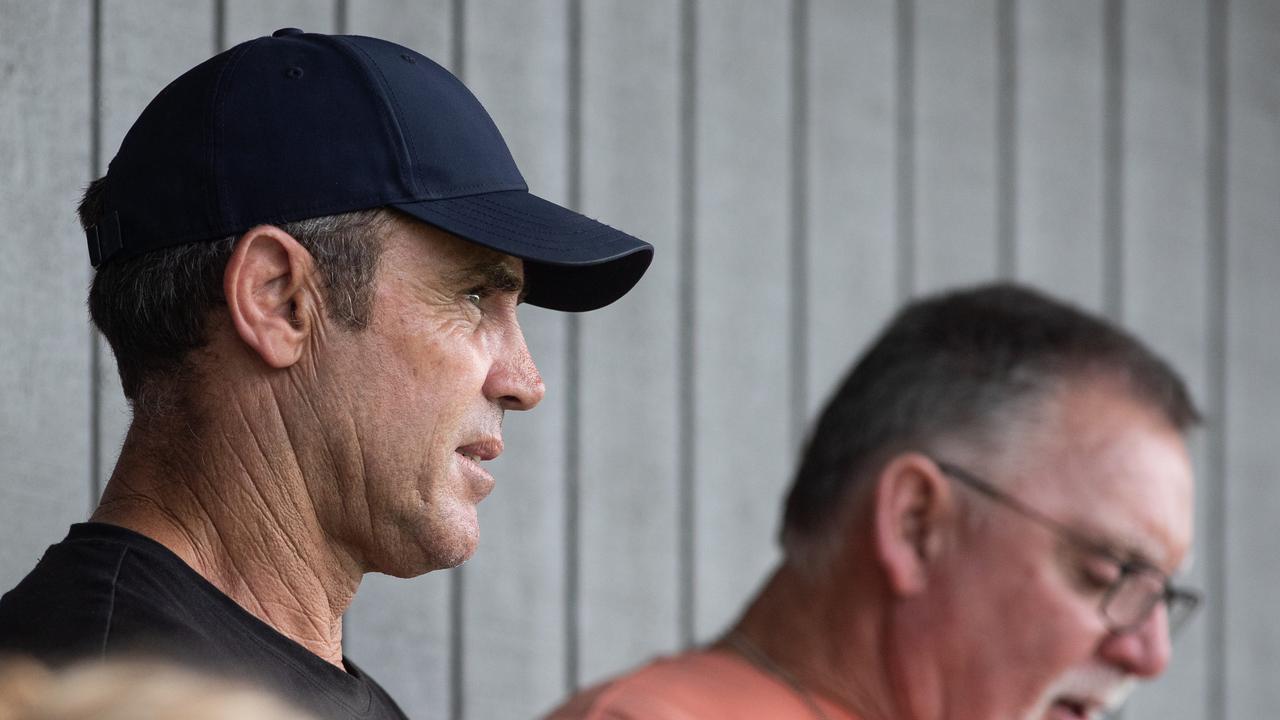Failed World Cup bid would put rugby in peril
There are grave fears for Australian rugby with their bid to host the World Cup in 2027 in danger.

The future of rugby in Australia is in peril should the World Cup bid fail as doubts grow over whether the federal government will provide funding for the tournament.
If Australia, who are currently World Rugby’s “preferred candidate” for 2027, lose the event, there is no easy path for the cash-strapped code to crawl out of its financial hole.
Both Rugby Australia chair Hamish McLennan and bid director Phil Kearns have repeatedly reinforced that clinching the event, on the back of the British Irish Lions tour here in 2025, would fill the coffers and lift the ailing code.
Last November, after being announced by World Rugby as the favoured host for 2027, Kearns said that hosting that tournament would be the “light on the hill” and “potentially secures the future for rugby for a long, long time in this country”.
That all changed this week. On Thursday, Kearns warned that the old enemy England could emerge as a rival host, and potentially leave Australian rugby stuck in its financial quagmire.
“It would be a massive blow to our future if we missed out on this tournament because we think that the Rugby World Cup in 2027 and the British Lions in 2025 get us on a great pathway to financial security for the game,” Kearns told The Weekend Australian.
“If we don’t come up with the right deal then it could go to England – where there is great certainty around the financial returns – given the amount of times they have hosted the tournament.”
The World Cup is World Rugby’s cash cow and that’s why Australia’s hope of hosting the tournament is suddenly more tenuous.
What Rugby Australia must do is guarantee World Rugby approximately a $300m return from the tournament, and while reportedly the states are keen to chip in half, RA is looking to the federal government to guarantee the rest and lift the bid over the final hurdle.
Two weeks ago, cracks in Australia’s bid appeared when rugby insiders learned that the federal government may not be as willing to come to the World Cup party as first anticipated.
It’s a stark contrast to how government officials were feeling toward rugby three years ago.
In 2019, federal and state government officials travelled to the World Cup in Japan and were blown away by the event, which ended up being the most financially successful tournament ever.
Japan’s event generated over $7.5bn in economic output and attracted more than 240,000 international visitors.
“They went to Japan and (the government officials) all went ‘this is amazing, we all want to be part of this’,” one source told The Weekend Australian.
The excitement has now apparently waned with bushfires, Covid and floods adding to the financial strain in Canberra.
Three years later, the fear is that with the Olympic Games secured for 2032, with the federal government expected to carry half of the $5bn budget, plus major events such as the women’s soccer World Cup in 2023, the money may not be there to support rugby’s showcase tournament.
McLennan admitted there was a risk of losing the tournament to a northern hemisphere nation, but said RA was working hard to clinch the funding.
But McLennan told The Weekend Australian that there was sufficient political support in Australia for the bid, and it was just a matter of working out a funding model that includes federal and state government support in time for the bid announcement that will likely be made in the first week of May.
“The state and federal governments have been very supportive so far,” McLennan said.
“They are all aware of the enormous opportunity to reboot tourism and share in the success that hosting the third-biggest sporting event in the world would be.”
A federal government source this week told The Weekend Australian they were ”continuing to work with RA”.
McLennan also pointed out that hosting the Women’s Rugby World Cup in 2029 would bring substantial benefits, and boost the women’s game in Australia.
It is also likely RA would ring-fence any private equity involvement from the World Cup income.
The last man to oversee a successful World Cup in Australia is John O’Neill.
The then ARU chief executive ran a successful World Cup which sold two million tickets and made a profit of $100m (but it was capped at $42m, with the remainder of the surplus handed back to World Rugby).
O’Neill says he wants nothing more than Australia to host in 2027 but he is “alarmed” to hear that the requirement for the financial guarantee to World Rugby may be in jeopardy.
As O’Neill points out following Australia’s financial windfall in 2003, rugby’s northern hemisphere powerbrokers, thinking the ARU had been “unduly enriched,” created a requirement for future hosts to underwrite a “massive” guarantee, effectively a rights fee, which has increased over the years and is expected to be around $300m by 2027.
“It’s just gone up, and up, from where it started off, and largely it’s been underwritten by the relevant national governments of the host union, as no rugby body in the world has that underwriting capability, only governments do,” O’Neill said.
“The tender document for RWC 2027 would have spelt out this requirement that to have a compliant bid, if you want to win the right to host 2027, you must provide a minimum guarantee or bank guarantee.
“Rugby World Cup may say to RA, if you cannot do that, then your bid is non-compliant.
“It’s a bit alarming. I should say no one is more supportive of Australia hosting 2027 than me. It will be a game-changer for rugby in Australia.
“We have a preferred bidder status but this considerable roadblock must be overcome now.”
Matt Carroll, who is now chief executive of the Australian Olympic Committee, the man who led the delivery of the 2003 Rugby World Cup in Australia, like O’Neill, is fiercely supportive of this country hosting the World Cup in 2027.
While some within government have noted that pitching in for a World Cup won’t be a vote winner for the Coalition with the general public – Carroll sees the event as crucial to Australia on many levels.
“We support the bid because it’s not only just about sport, it’s about getting the economy moving again,” Carroll said.
“It’s a huge opportunity for tourism, infrastructure and it’s about providing jobs. So an investment by the government in the sports industry is as good as investing in other industries.
“And with the sports industry, you also get the knock-on effect of which performance sport provides to growing participation, which means, you get to help with the other crisis people have forgotten about – the obesity crisis.
“Rugby is an integral part of the Australian sporting landscape, you know, people say ‘oh, well (hosting the World Cup) that’s just for the rugby world’.
“I say ‘no, it’s actually for the country’ and it brings all those other benefits that adds value.
“It’s not just the government giving money to a sporting organisation. This is actually an investment in an event which is going to deliver for the country.”



To join the conversation, please log in. Don't have an account? Register
Join the conversation, you are commenting as Logout